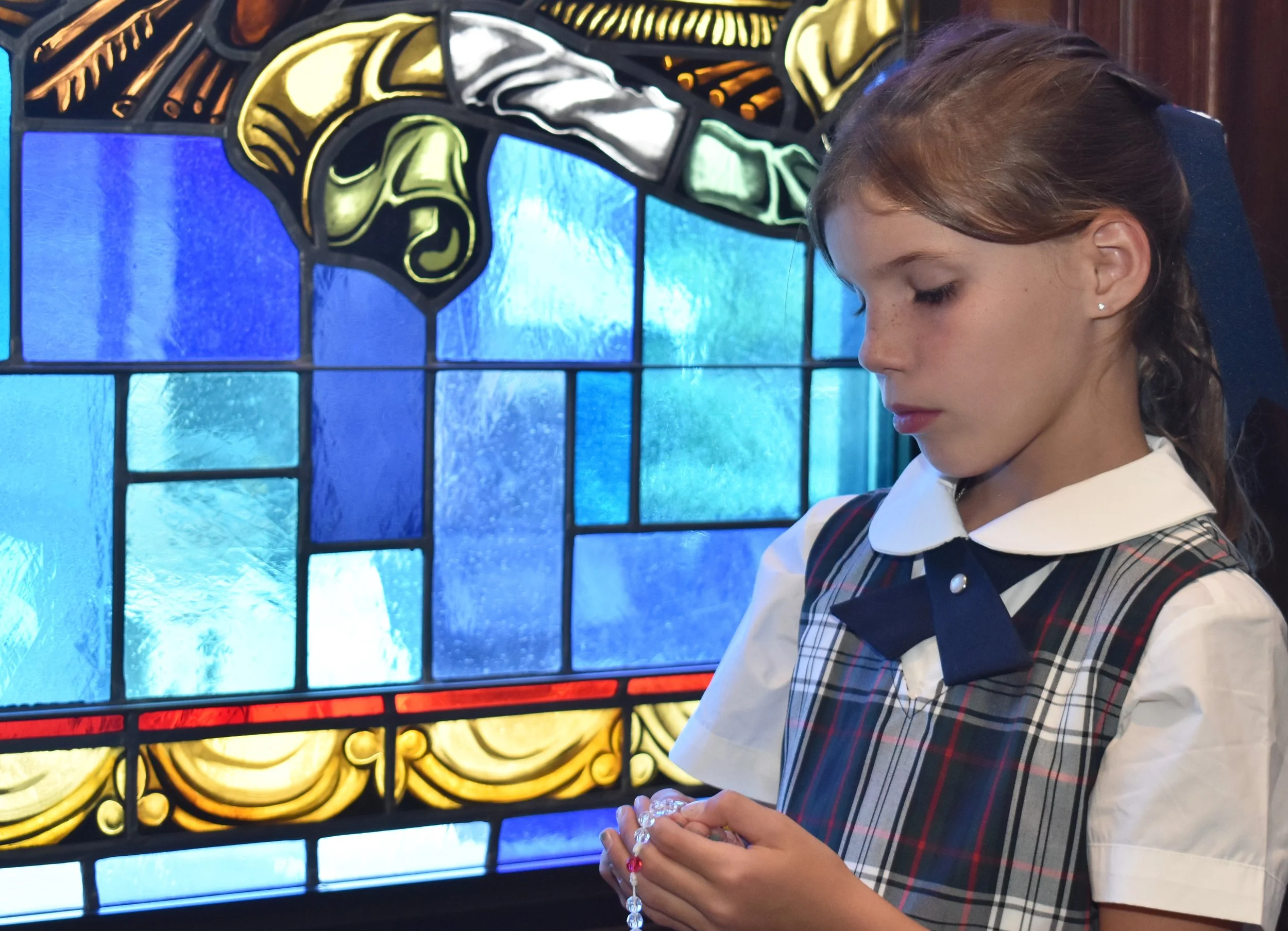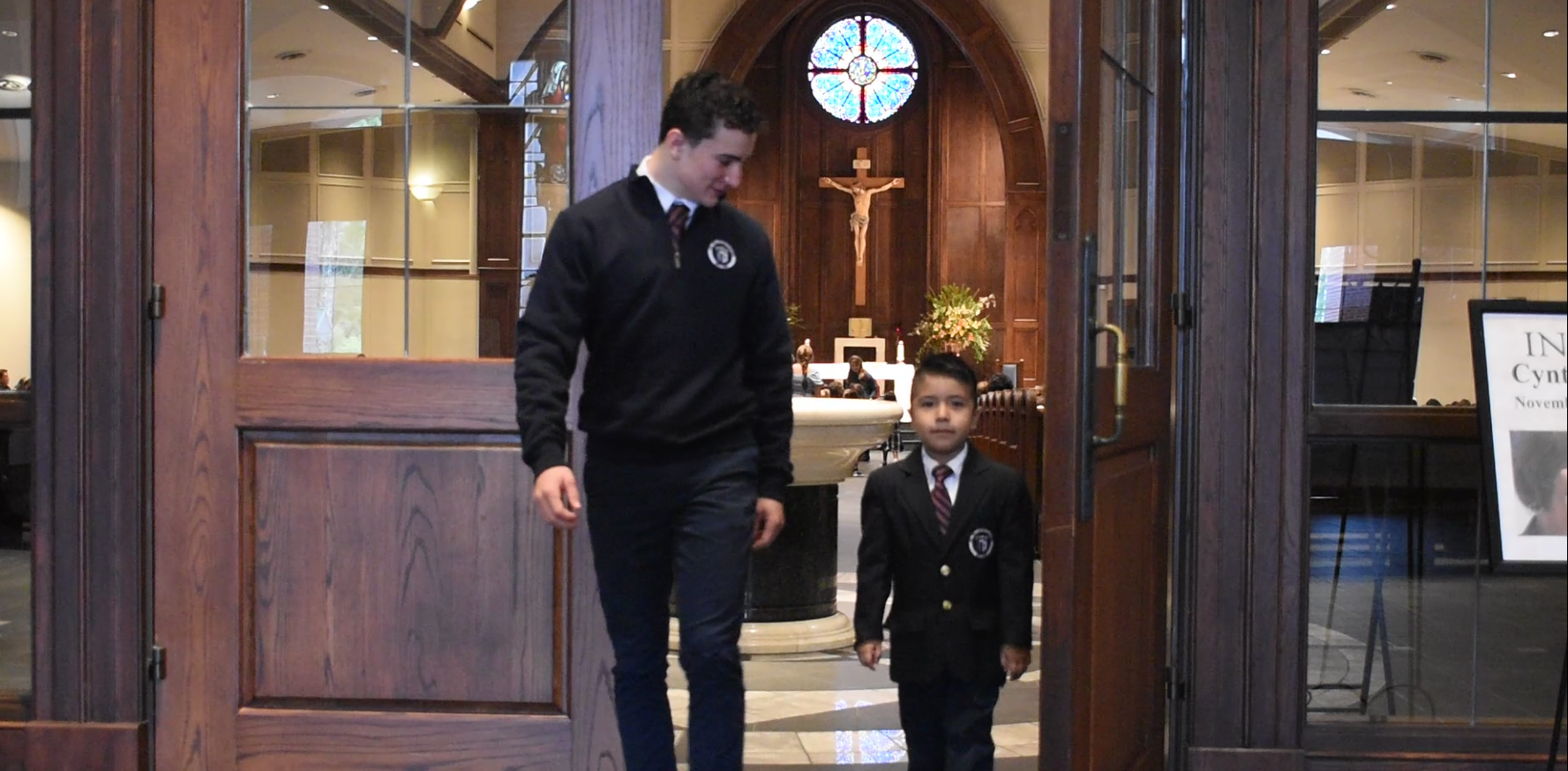Our Mission
St. Francis Xavier School inspires students to grow in faith, wisdom, and virtue as disciples of Jesus Christ. By encountering Divine Truth revealed throughout the ages, our classical Catholic education fosters in students a love for the True, Good, and Beautiful as reflected in the glory of Christ.
What is education for? At St. Francis Xavier, we begin with this question in mind, and everything that we do follows from the answer we give it. Our answer is this: education is for cultivating human persons. Catholic education, specifically, is for cultivating human persons to become followers of Christ.
A school’s answer to this question is important. If we thought education was for some other purpose, such as to create effective consumers, the way we would teach our students would be profoundly different.
For instance, because we believe that human persons, and not just parts of human persons, are the proper objects of education, we always consider the whole child, body and soul, in our approach to teaching.
We don’t just want our students to become successful in whatever occupation they choose when they become adults. We want each of them to joyfully follow his or her vocation, to grow in faith, wisdom, and virtue, and, ultimately, to become saints.
Pope St. John Paul II said:
“The mission of the Catholic school is the integral formation of students, so that they may be true to their condition as Christ’s disciples and as such work effectively for the evangelization of culture and for the common good of society.”
Much like a farmer uses tools like a plow, a shovel, and a hoe to prepare fields for sowing, educators need tools of their own. Fortunately, the Catholic Intellectual Tradition provides us with many of the best tools to prepare students to flourish in the community, the workplace, the family, and the Church.
Among these tools are the seven liberal arts, first of language (grammar, logic, and rhetoric) and then of number (arithmetic, geometry, music, and astronomy). Ever since the Greek philosopher Plato founded his Academy in the fourth century B.C., the liberal arts have been thought to be suitable for the cultivation of free persons (hence, the title liberal, from the Latin adjective liber, meaning free). A free person is the kind of person who is free to be who he or she was created to be. The saint is the freest person of all.
Christians throughout the ancient, medieval, and early modern periods understood the value of the liberal arts in preparing young men and women to be disciples. So, they kept the liberal arts as the foundation of Western education, and, on top of them, taught natural science, fine arts, philosophy, and theology.
We call ourselves “classical” precisely to pay tribute to the ancient origins of the liberal arts approach to learning, which our curriculum remains firmly rooted in.
A Rich Foundation in the Liberal Arts
On top of our foundation of the liberal arts, we place three very important pillars: wisdom, faith, and virtue. These three pillars uphold the kind of human person we aspire to cultivate here at St. Francis Xavier.
Three Pillars: Wisdom, Faith, and Virtue
St. Thomas Aquinas, the 13th-century philosopher and patron saint of Catholic schools, listed wisdom as one of the seven gifts of the Holy Spirit.
Wisdom is the knowledge of divine truths and the ability to make judgments about human affairs according to them. Wisdom begins with piety, that is, reverence for God and all He deems sacred (“The fear of the LORD is the beginning of wisdom”), but it progresses through wonder, an innate desire for knowledge.
With wonder, learning becomes a joyful pursuit of wisdom. This is exactly what we aim to foster in every one of our students, and our goal is that they feel encouraged to continue this pursuit far beyond 8th-grade graduation.
Wisdom
Evangelization and catechesis are inseparable from our mission as a Catholic school. Though we welcome families from non-Catholic faiths as well as Catholics, we intend to expose all students to the fullness of the Catholic faith.
According to the Catechism of the Catholic Church:
Faith
“Faith is man's response to God, who reveals himself and gives himself to man, at the same time bringing man a superabundant light as he searches for the ultimate meaning of his life.” (CCC, 1.26)
Ultimately, faith involves our believing in, trusting in, and committing to God. This, of course, requires grace, which is why St. Thomas categorized it as a theological virtue. Yet, faith still requires something of us. In faith, one’s intellect and will cooperate with grace.
Whether it be attending weekly school Mass, praying the Children’s Rosary on Fridays, beginning and ending every day in prayer, learning about Sacred Scripture, the Saints, and the history of the Church in the classroom, or preparing to receive the Sacraments, St. Francis Xavier students are regularly steeped in the faith and constantly invited to welcome Christ into their hearts.
A virtue is a habitualized disposition to do excellent things. But true virtue is not just any kind of excellence. It is not an excellence predicated on worldly power, domination, or intimidation. Rather, it is an excellence in service to God and neighbor.
It’s not enough to intellectually comprehend what is right and wrong. Excellence must be embodied, and that’s exactly what virtue is. Our virtues are not facts we assent to, but part of who we are. They are part of our character.
At St. Francis Xavier, we want the character of our students to embody such virtues as prudence, temperance, fortitude, and justice (which St. Thomas identified as cardinal virtues) and their subsequent parts.




